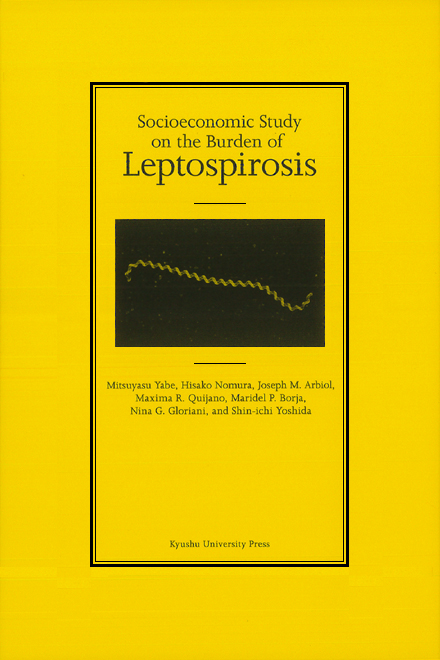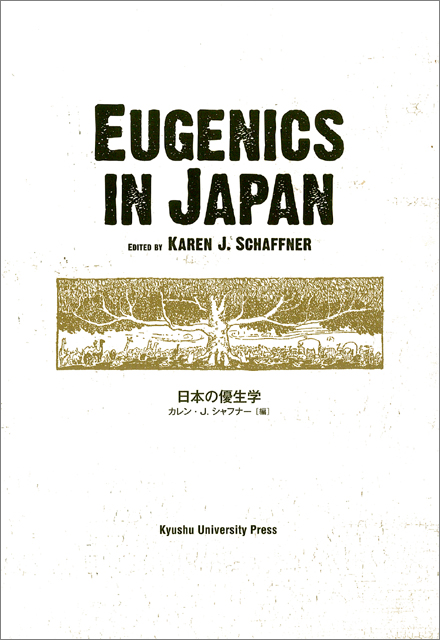- HOME >
- BOOKLIST >
- Natural sciences>
- Socioeconomic Study on the Burden of Leptospirosis
Socioeconomic Study on the Burden of Leptospirosis
Introduction
Contents
Summary
1. Introduction
2. Profile of Leptospirosis Patients
3. Household Characteristics of Leptospirosis Patients
4. Leptospirosis Infection and Health-Seeking Behavior
5. Cost of Illness Associated with Leptospirosis
6. Methods used to Cover the Cost of Leptospirosis
7. Conclusion
Summary
1. Introduction
2. Descriptive Analysis
3. Factors Affecting the Financial Burden of Leptospirosis
4. Conclusions and Policy Recommendations
Author
Joseph M. Arbiol is currently a doctoral student in Environmental Economics at the School of Bioresource and Bioenvironmental Sciences, Faculty of Agriculture, Kyushu University. His research interests include the economic burden of diseases, fisheries resource economics and management, and discrete choice modeling.
Maridel P. Borja is a Professor of Epidemiology and Statistics at the University of the Philippines-College of Public Health, and also holds the position of Assistant to the Dean for Academic Affairs. She completed her undergraduate degree in Medical Technology (summa cum laude) at the University of Santo Tomas, Philippines. She holds two masters degrees, one in Public Health from the University of the Philippines and the other in Medical Statistics from the London School of Hygiene and Tropical Medicine, United Kingdom. She received her doctoral degree in Epidemiology from the University of California, USA in 1998. Dr Borja has done extensive studies on the epidemiology and disease burden of leptospirosis, HIV and lung cancer in the Philippines.
Nina G. Gloriani is currently a Full Professor of Medical Microbiology and Immunology. She served as Dean of the University of the Philippines-College of Public Health (UP-CPH), and concurrent Director of SEAMEO-TROPMED Regional Center for Public Health, Hospital Administration, Environmental and Occupational Health from 2007 to 2013. From 1995-2005, she served as Director of the Institute of Biotechnology and Molecular Biology of the National Institutes of Health-Philippines, and Chairman of the Department of Medical Microbiology of UP-CPH. Dr. Gloriani is an active member of various professional and scientific organizations. She is currently the President of the Biotechnology Coalition of the Philippines; a Fellow of various medical and professional societies of Microbiology, Allergy and Immunology; an Editor of the Southeast Asian Journal of Tropical Medicine and Public Health; and a member of the Editorial Board of the Philippine Journal of Allergy and Immunology and peer reviewer of Acta Medica Philippina. She has written 42 scientific publications on Hepatitis A, B and C, HIV, Hantaan Virus, Leptospirosis, and a number of vaccine trials. Dr. Gloriani continues to serve as the Chairperson of the National Certification Committee for the Eradication of Poliomyelitis in the Philippines, and as technical consultant to various agencies in the fields of medical microbiology and microbial immunology. She had received many awards, most notably the UPAA 2006 Outstanding Professional Award in Public Health, and the PSM Outstanding Microbiologist award.
Hisako Nomura is a lecturer at the Faculty of Agriculture, Kyushu University. She obtained her Ph.D. degree in 2005 at the Institute of Development and Policy Management, Manchester University, U.K. Her Ph.D. research focused on the use of contingent valuation method to measure farmers’ willingness to adopt sustainable agricultural practices. She has conducted empirical researches on the implementation of strategic policy assessment and policy-design leading to sustainable development. Her research aims to establish an economic research for policy assessment and policy-design that are based not only in the application of economic theories, but also that of sociology and psychology; and to analyze policies from various aspects and provide recommendations to complement and improve current policies. Her research interests on policy assessment include policy consistency and enhancement of domestic agricultural and environmental policies under international trade agreements, EU agri-environmental policies, and enhancing women’s contribution to development. Her research interests on policy designs include rural development, sustainable resource management and livelihoods, and health policy.
Maxima R. Quijano obtained her Bachelor degree in Business Management at the Polytechnic University of the Philippines. She previously worked in numerous non- governmental organizations as a developmental worker involved in environment and research works. At present, she is working as a health researcher in several departments of the University of the Philippines-Manila. Her past project involvements include study on women’s health and family planning practices, national objectives of health survey, evaluation of field health information system, and urban health nutrition program. She is presently involved in the control and eradication of tuberculosis project of the Department of Health and Philippine Tuburculosis Society.
Mitsuyasu Yabe is Professor at the Department of Agricultural and Resource Economics at Kyushu University in Japan. He has 30 years’ experience in the fields of Environmental Economics, Natural Resource Economics, Agricultural Economics and Health Economics. He is an expert on environmental valuation and has worked on landscape and biodiversity valuation and on the use of economic analysis in the design of agri-environmental policy. He also has been involved in a variety of research activities in the evaluation on effective use of biomass, bio-fuel policy, food safety, and economic evaluation on the burden of Leptospirosis. He obtained his Ph.D. from the Department of Agricultural Economics, Kyoto University, Japan.
Shin-ichi Yoshida obtained his medical and Ph.D. degrees from Kyushu University. He began his career as an Assistant Professor at Kyushu University in 1979. He then transferred to the University of Occupational and Environmental Health, where he held various teaching positions at the Department of Microbiology. He returned to Kyushu University in 1998, where he currently holds the rank of Professor at the Department of Bacteriology, School of Medicine. His initial research interest was immunology, and changed in later years to include the areas of host-parasite relationship, pathogenesis of infectious diseases, and ecology of pathogenic bacteria. He has made substantial research contributions on the pathogenicities of Legionella spp., Enterohemorrhagic E. coli, Vibrio vulnificus, Streptococcus spp., and Leptospira spp. Since 2006, he has received research grants from various Japanese funding institutions to study Leptospira bacteria, and methods to control and prevent its infection in Asia.


